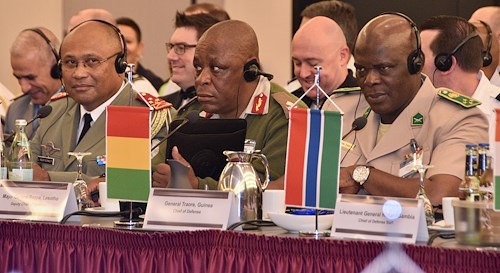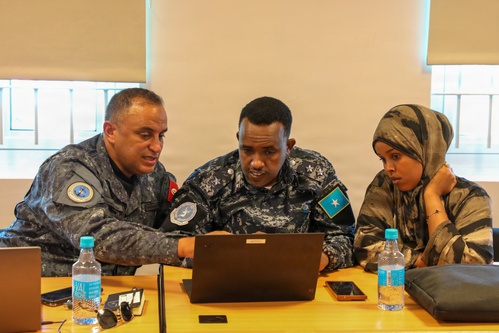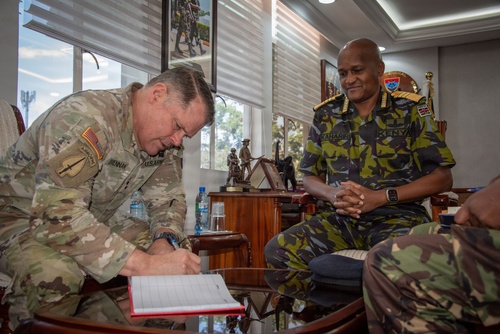Gallery contains 9 images
×
Photo 1 of 9
AFRICOM hosts first ever Chiefs of Defense conference
More than 40 African Chiefs of Defense or their representatives participated in the first ever CHoD conference hosted by U.S. Africa Command, April 19-20, 2017, in Stuttgart, GE. Countering VEOs and peace support operations were the central topics for discussion. (Photos by Brenda Law and Staff Sgt. Grady Jones, U.S. AFRICOM Public Affairs/Released)
Photo 2 of 9
AFRICOM hosts first ever Chiefs of Defense conference
More than 40 African Chiefs of Defense or their representatives participated in the first ever CHoD conference hosted by U.S. Africa Command, April 19-20, 2017, in Stuttgart, GE. Countering VEOs and peace support operations were the central topics for discussion. (Photos by Brenda Law and Staff Sgt. Grady Jones, U.S. AFRICOM Public Affairs/Released)
Photo 3 of 9
AFRICOM hosts first ever Chiefs of Defense conference
More than 40 African Chiefs of Defense or their representatives participated in the first ever CHoD conference hosted by U.S. Africa Command, April 19-20, 2017, in Stuttgart, GE. Countering VEOs and peace support operations were the central topics for discussion. (Photos by Brenda Law and Staff Sgt. Grady Jones, U.S. AFRICOM Public Affairs/Released)
Photo 4 of 9
AFRICOM hosts first ever Chiefs of Defense conference
More than 40 African Chiefs of Defense or their representatives participated in the first ever CHoD conference hosted by U.S. Africa Command, April 19-20, 2017, in Stuttgart, GE. Countering VEOs and peace support operations were the central topics for discussion. (Photos by Brenda Law and Staff Sgt. Grady Jones, U.S. AFRICOM Public Affairs/Released)
Photo 5 of 9
AFRICOM hosts first ever Chiefs of Defense conference
More than 40 African Chiefs of Defense or their representatives participated in the first ever CHoD conference hosted by U.S. Africa Command, April 19-20, 2017, in Stuttgart, GE. Countering VEOs and peace support operations were the central topics for discussion. (Photos by Brenda Law and Staff Sgt. Grady Jones, U.S. AFRICOM Public Affairs/Released)
Photo 6 of 9
AFRICOM hosts first ever Chiefs of Defense conference
More than 40 African Chiefs of Defense or their representatives participated in the first ever CHoD conference hosted by U.S. Africa Command, April 19-20, 2017, in Stuttgart, GE. Countering VEOs and peace support operations were the central topics for discussion. (Photos by Brenda Law and Staff Sgt. Grady Jones, U.S. AFRICOM Public Affairs/Released)
Photo 7 of 9
AFRICOM hosts first ever Chiefs of Defense conference
More than 40 African Chiefs of Defense or their representatives participated in the first ever CHoD conference hosted by U.S. Africa Command, April 19-20, 2017, in Stuttgart, GE. Countering VEOs and peace support operations were the central topics for discussion. (Photos by Brenda Law and Staff Sgt. Grady Jones, U.S. AFRICOM Public Affairs/Released)
Photo 8 of 9
AFRICOM hosts first ever Chiefs of Defense conference
More than 40 African Chiefs of Defense or their representatives participated in the first ever CHoD conference hosted by U.S. Africa Command, April 19-20, 2017, in Stuttgart, GE. Countering VEOs and peace support operations were the central topics for discussion. (Photos by Brenda Law and Staff Sgt. Grady Jones, U.S. AFRICOM Public Affairs/Released)
Photo 9 of 9
AFRICOM hosts first ever Chiefs of Defense conference
More than 40 African Chiefs of Defense or their representatives participated in the first ever CHoD conference hosted by U.S. Africa Command, April 19-20, 2017, in Stuttgart, GE. Countering VEOs and peace support operations were the central topics for discussion. (Photos by Brenda Law and Staff Sgt. Grady Jones, U.S. AFRICOM Public Affairs/Released)
STUTTGART - More than 225 attendees from various organizations participated in the first ever U.S. Africa Command Chiefs of Defense (CHoD) conference, April 19-20. Besides AFRICOM senior leadership were representatives from 42 African countries, 35 U.S. Defense Attachés, AFRICOM Component Commanders, and members of the Joint Staff. Also attending were representatives from the U.S. State Department, the U.S. Agency for International Development (USAID), the Institute of Defense Analysis, and Non-Governmental Organizations (NGOs) who operate on the continent.
In his opening remarks, U.S. Marine Corps Gen. Thomas D. Waldhauser, Commander, U.S. Africa Command said, “Our goal is to have this conference defined by you and the issues of concern to your countries.
“As many of you know, the United States Africa Command was established 10 years ago as a reflection of the U.S. vital strategic interests.
“Ten years ago--in keeping with our National strategic objectives--we envisioned our overarching purpose to foster security, stability, and prosperity in Africa.
“This remains our purpose today,” said Waldhauser.
A key element of the conference were panel discussions, the first of which was conducted on day one and focused on countering violent extremist organizations (VEOs.) Day two’s panel topic was on peace support operations. Each panel was led by various CHoDs, with the Director of the Africa Center of Strategic Studies, MS. Kate Knopf, serving as facilitator.
Knopf, who leads an academic institution established by the U.S. Congress for the study of security issues relating to Africa, said that the panel topics were chosen based on the desire by the CHoDs to have an opportunity to meet and discuss these issues.
Frequently referenced throughout discussion was the importance of the Africa Standby Force (ASF) and the regional brigades.
“The African Standby Force is one of the key elements of the African Peace and Security Architecture (APSA),” said Knopf.
“The CHoDs have worked hard to stand up the ASF,” said Knopf, and in so doing they represent the will and commitment to take this on.”
Featured presenters at the conference were the Commander of the Multinational Joint Task Force, Major Gen. Lamidi Oyebayo Adeosun, and Force Commander, African Union Mission to Somalia, Lt. Gen. Osman Noor Soubagleh, who shared their personal experiences as leaders who have dealt with countering VEOs, and their ideas for developing strategies for effective peace support operations.
“Peace and security in Somalia is the goal,” said Chairperson of the African Union Commission (SRCC) for Somalia Ambassador Francisco Caetano Jose Madeira, “and we need to establish government institutions to prevent further conflict.
“A government is necessary in providing services so people know that they have someone able to help solve problems,” said Madeira.
“We must strengthen our government institutions,” said Madeira.
“We need AMISOM, and we must strengthen the Somalia National Security Force (SNSF.)
“Let’s resolve to remove Al-Shabaab from the remaining towns and villages,” said Madeira.
“Taking these would deny Al-Shabaab a safe place to re-plan and re-supply,” he said, then continuing, “Let’s transform main supply routes into havens of safety.”
“Technical equipment is needed to survey Al-Shabaab and we need to make it difficult for them to collect intel.
“We’re taking money from education and health to support defense,” said Madeira, “so we need your help.”
Madeira concluded by saying, “On behalf of AMISOM, I want to thank the USA.”
Participants moved into smaller discussion groups based on more regional challenges for the remainder of the day.
During a formal dinner at the end of day one, Nigerian scholar and diplomat, Professor Ibrahim Gambari presented the keynote address in which he shared his perspectives on the complexities of Africa’s security challenges and ways in which he thought they might be overcome.
The topic of his comments: Countering violent extremism and enhancing Africa’s peace support operations – challenges and opportunities.
Acknowledging the crucial role of NGOs in peace support operations, Gambari said it was important to find “common ground” and to not take sides.
“How can I take sides if we want to make peace?” said Gambari.
He talked about the changing nature of war and that combat is asymmetrical, stating that this is an issue that must be considered when developing strategies.
From a lifetime of experiences, he also talked about lessons learned in the complex environment of peace support operations.
“The role of women in peacekeeping operations cannot be over emphasized,” said Gambari.
“Just look at the 2008 UN Security Council resolution 1820 on women, peace and security, to understand how significantly peace operations improved due to women participating in the process. They are really better at keeping the peace than men are!”
Gambari concluded his remarks by commenting on what others had been saying throughout the day, “Prevention should given a very prominent place and requires the collective effort of all countries,” he said.
“It’s all about prevention and ‘We The People,’” said Gambari.
Peace support operations dominated the discussions on day two. Amongst the panel members was Gen. Patrick Nyamvumba of Rwanda, who recounted a story about his first assignment as a commander for a peacekeeping assignment.
Nyamvumba recalled that early in his career he had an unfortunate event as a peacekeeper.
He recounted the story about being asked by an ambassador, “Can you guarantee that no troops will be killed if I support this mission?”
Nyamvumba, stating he was not clear he had understood the ambassador answered, “What?”
“The ambassador repeated his question, ‘Can you guarantee no one will get killed?’”
Nyamvumba, noting that he had not yet developed diplomatic skills, said he told the ambassador, “We join the military forces to fight for our country and that comes with the willingness to sacrifice our lives. We must have that same mindset as a peacekeeper.”
And at the CHoD conference, Nyamvumba said, “There is inherent risk, but if you fail to protect people, you must remember that we have the obligation to at least protect lives because this is the minimum we can do.”
“The mindset of the peacekeepers is most important,” said Nyamvumba.
In his closing remarks, Waldhauser echoed the comments of the Rwandan general, saying, “You’re right, I can’t guarantee you’ll live forever.
“Training for peacekeepers is just as important as for any deployment,” said Waldhauser, “We can’t sell training for peacekeepers short!”
“We’re here to help you when you want us and can step back when you don’t" said Waldhauser.
Check out more photos on the AFRICOM Flickr page.































